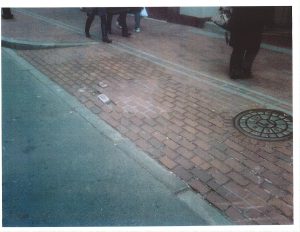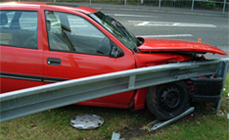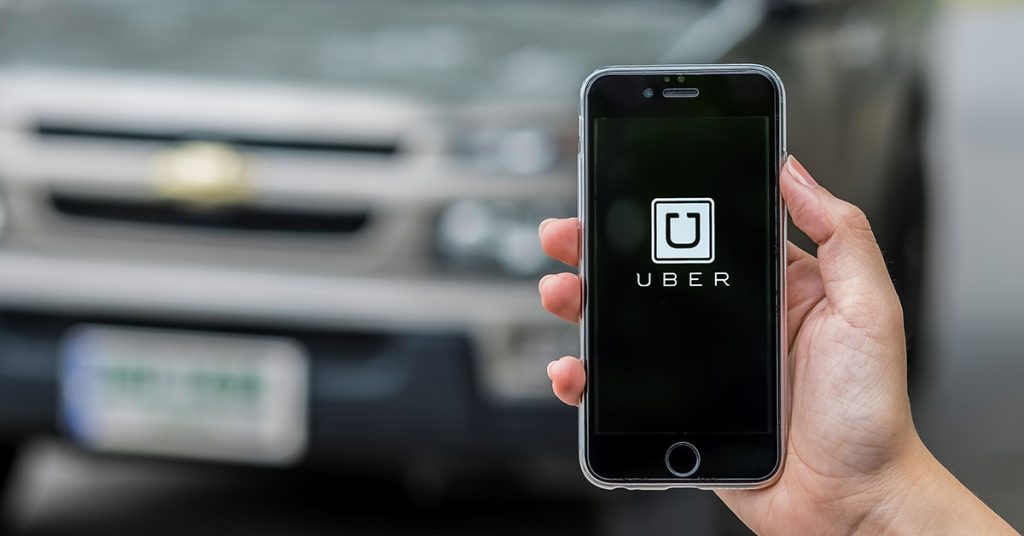Posts Tagged ‘“Supreme Judicial Court”’
Massachusetts Supreme Judicial Court Rules Uber’s App Failed to Provide Consumers Reasonable Notice of Terms and Conditions

The Massachusetts Supreme Judicial Court has ruled Uber did not provide users with reasonable notice of its terms and conditions.
Have you ever signed up for a rideshare app and been frustrated to see the extensive terms and conditions – all on your small cell phone screen? Just what are you agreeing to?
You are not alone. Now, the Supreme Judicial Court of Massachusetts has found Uber failed to provide reasonable notice of its terms and conditions to users. A Massachusetts man and a family member filed a discrimination lawsuit against Uber in 2016, then were compelled into arbitration with the rideshare company based on the app’s terms and conditions.
But on Monday, the Supreme Judicial Court ruled there was no enforceable arbitration agreement between Uber and the plaintiffs in Christopher P. Kauders & another vs. Uber Technologies, Inc. The Supreme Judicial Court remanded the case back to Superior Court.
The Court reviewed Uber’s complicated registration process, noting app users could easily bypass the initial screens, but the process grew much more cumbersome as the consumer approached the terms and conditions and privacy policy.
The Court wrote certain terms and conditions were extensive and far reaching and, “may literally require an individual user to sign his or her life away, as Uber may not be liable if something happened to the user during one of the rides.”
The Facts
In 2016, the plaintiffs filed a civil lawsuit against Uber in Suffolk Superior Court, claiming that Uber had discriminated against them in violation of M.G. L. c. 272, § 98A. This statute prohibits discrimination against anyone who is blind, deaf or has another physical handicap and is accompanied by a guide dog in Massachusetts. One of the plaintiffs was blind and claimed three Uber drivers had refused him service in 2015 and 2016.
Citing a provision in its terms and conditions, Uber moved for arbitration against the plaintiffs’ opposition. On June 4, 2018, the arbitrator issued a ruling finding that Uber was not liable for the discriminatory acts of the drivers, who are independent contractors.
Then, on June 25, 2018, a decision came in the case of Cullinane vs. Uber Techs, Inc. The United States Court of Appeals for the First Circuit ruled that Uber’s registration process did not create a contract because app users did not have reasonable notice of the terms and conditions.
Users Not Given Reasonable Notice of Terms and Conditions
In Kauders, the Massachusetts Supreme Judicial Court wrote that Uber writes terms which are extremely favorable to the company and does not give users “reasonable notice” of the terms and conditions.
The Court concluded, “Uber’s terms and conditions did not constitute a contract with the plaintiffs. The app’s registration process did not provide users with reasonable notice of the terms and conditions and did not obtain a clear manifestation of assent to the terms, both of which could have been easily achieved.”
Another problem, the Court wrote, is Uber can amend the terms and conditions whenever it wants without consent from users. The burden is on the consumer to keep checking and there is no way for the consumer to object.
In response to the decision, an Uber spokeswoman told The Boston Globe the company had already modified its application forms in a way that should comply with the Court’s reasoning.
What if You Are Injured in a Rideshare Accident?
Rideshare companies have worked to limit their liability in many areas. However, those injured in rideshare car accidents in Massachusetts still have the right to pursue financial compensation for their injuries. In 2016, Massachusetts passed legislation to regulate Uber, Lyft, and other transportation network companies. Under the legislation, drivers must carry an adequate level of auto insurance while working for a rideshare company.
Rideshare accidents can happen and injure passengers, but also drivers of other vehicles and their passengers, as well as pedestrians and cyclists. If you have been injured, it is important to document whether a driver was operating a rideshare vehicle for work or personal use at the time of the crash.
This may be important because rideshare drivers are required to have additional coverage when logged onto the transportation company’s digital network or while the driver is engaged in a pre-arranged ride in Massachusetts.
In the News
Watch Attorney David W. White speak to NBC Boston about complicated rideshare app agreements in 2019:
Boston Car Accident Lawyers – Breakstone, White & Gluck
Breakstone, White & Gluck specializes in the handling of personal injury cases in Massachusetts and has been consistently recognized for our results, including as Top 100 New England Super Lawyers and Top 100 Massachusetts Super Lawyers.
If you have been injured in a car accident or a rideshare accident, learn your legal rights. It is in your best interest to consult a Boston car accident attorney before signing any documentation or speaking to the driver’s insurance company.
For a free legal consultation, contact Breakstone, White & Gluck at 800-379-1244 or 617-723-7676 or use our contact form.
Attorney Marc L. Breakstone Quoted in Massachusetts Lawyers Weekly Article on Antiquated Sidewalk Liability Laws
Attorney Marc L. Breakstone was quoted in a front-page Massachusetts Lawyers Weekly article about common law liability for injuries caused by sidewalk defects. The current common-law standard dates back centuries and prohibits many plaintiffs from recovering compensation for injuries. But a recent Appeals Court ruling may have finally set the stage for change.
Attorney Breakstone welcomes the idea. “I think that the common law is a living body of principles that has to evolve as social conditions and the realities of life evolve,” he said.
 Earlier this month, the Appeals Court ruled in the case of Halbach, et al. v. Normandy Real Estate Partners, et al., concurring that a Superior Court judge had correctly granted summary judgment to the defendant, 100 & 200 Clarendon LLC, which operated, leased and maintained the John Hancock Tower and a neighboring garage in Boston.
Earlier this month, the Appeals Court ruled in the case of Halbach, et al. v. Normandy Real Estate Partners, et al., concurring that a Superior Court judge had correctly granted summary judgment to the defendant, 100 & 200 Clarendon LLC, which operated, leased and maintained the John Hancock Tower and a neighboring garage in Boston.
The Appeals Court rejected the plaintiffs’ argument that the defendant had been negligent in keeping the sidewalk free from defects and had failed to uphold their duty “to ensure a safe pedestrian walkway.”
The Appeals Court said the plaintiffs were suggesting “an entirely new duty” not recognized by state common law. The Appeals Court further noted that there is no affirmative duty to inspect and repair public sidewalks or notify the city.
In Massachusetts, cities generally have limited liability of $5,000 for personal injuries and property damage from defective ways, which also leaves plaintiffs who are injured with limited remedy.
Next Steps
In 2009, a man fell on uneven sidewalk after leaving his office at the John Hancock Tower in Boston. He suffered a bilateral rupture of his quadriceps tendon. After the fall, the defendant, 100 & 200 Clarendon LLC, did make some repairs, with no attempt to seek reimbursement from the city of Boston.
The man and his wife filed a lawsuit in Suffolk Superior Court in February 2012 and filed a motion for summary judgment in January 2014.
Appeals Court Judge James R. Milkey wrote that “the plaintiffs have a more forceful case for … a change in the law than the majority opinion suggests.”
The Supreme Judicial Court could now review the Appeals Court ruling and decide whether to extend a duty for sidewalks to private owners.
Attorney Breakstone told Massachusetts Lawyers Weekly this would be a “baby step for the evolution of our tort law.” It is a widely accepted principle that businesses making a profit from the customers they attract onto their premises have to provide safe egress, he said.
In 2010, the Supreme Judicial Court decision in Papadopoulos v. Target Corp. abolished the common-law distinction between natural and artificial accumulation of snow and ice. In Massachusetts, property owners are now responsible for clearing all areas of their property under the standard of “reasonable care,” regardless of whether they created the snow pile or if it naturally formed.
Read the full article on the Massachusetts Lawyers Weekly website. Subscription required for access.
About Attorney Marc L. Breakstone
Marc L. Breakstone has established a reputation as one of the top medical malpractice and personal injury lawyers in New England. His record-setting settlements and verdicts have earned him the distinction of being selected as one of the Top 100 Super Lawyers in New England and Top 100 Super Lawyers in Massachusetts. He has also been selected by his peers as one of the top medical malpractice plaintiff’s lawyers in the Super Lawyer balloting. In 2002, Attorney Breakstone was honored as one of ten “Lawyers of the Year” by Massachusetts Lawyers Weekly. More on Marc Breakstone.
About Breakstone, White & Gluck
The Boston personal injury attorneys at Breakstone, White & Gluck have over 100 years combined experience handling personal injury and premises liability cases for those who have been seriously injured. If you have been injured, it is important to learn your rights. For a free legal consultation, contact us at 800-379-1244 or 617-723-7676 or use our contact form.
DiCarlo: SJC tells Workers’ Comp Insurers: You Can’t Get What You Don’t Pay For
In a major victory for the rights of injured workers, the Supreme Judicial Court ruled today that pain and suffering damages, to which injured workers are entitled in their accident cases, are not subject to liens from workers’ compensation insurance companies. As a result of the ruling, workers will be able to keep more of their personal injury settlements and verdicts.
Until today, there was confusion over the relationship between workers’ compensation liens and damages paid by a third party to employees for worksite injuries. If an employee gets injured, he or she is entitled to workers’ compensation for lost wages, medical bills, and other specific damages. But workers’ compensation insurance does not pay for pain and suffering damages.
If the worker collects workers’ comp, then successfully sues a third party (not his employer) for those injuries, he or she has a duty to reimburse the insurance carrier up to a point. The mechanism to regulate reimbursement to the insurance company is General Laws c. 152, § 15. The statute provides that an employer can recover its workers’ compensation payments to its employee, if that employee recovers money from a third party.
But, as mentioned above, workers’ compensation pays for lost wages and medical expenses. In a tort lawsuit, an injured party is entitled to more than that, including damages for pain and suffering. In the case where an employee simply recovers lost wages and medical expenses from a third party, there is no dispute that that money is returned to the workers’ compensation insurer in the amount that was paid. Any excess, the employee keeps. But, what about when an employee also gets money for pain and suffering? Does the workers’ compensation insurer get that money back, too?
Today, the SJC said, in no uncertain terms, no. They didn’t quite say “you can’t always get what you want.” But, they did say, you get can’t what you don’t pay for. Workers’ compensation does not pay for pain and suffering. So, if an employee gets a recovery that specifically sets aside damages for pain and suffering, that employee keeps that set-aside amount. Anything else is liable to go back to the workers’ compensation insurer for the amount that was paid (minus its fair proportionate share of attorney’s fees and expenses).
The cases were DiCarlo v. Suffolk Constr. Co., SJC docket no. 11854; Martin v. Angelini Plastering, Inc., SJC docket no. 11853 (both decided February 12, 2016).
For a more detailed analysis, click here.
About Breakstone, White & Gluck
The Boston personal injury lawyers at Breakstone, White & Gluck have over 100 years combined experience representing motorists, pedestrians and cyclists who have been seriously injured in car accidents. If you have been injured, it is important to learn your rights. For a free legal consultation, contact us today at 800-379-1244 or 617-723-7676 or use our contact form.
SJC: Personal Injury Case May Proceed Against City of Newton
 The Massachusetts Supreme Judicial Court has rejected an appeal by the City of Newton which attempted to claim an exemption from liability for personal injuries suffered by a softball player on one of its fields. The City claimed it was exempt from liability under the Recreational Use Statute, but the court ruled the statute did not apply.
The Massachusetts Supreme Judicial Court has rejected an appeal by the City of Newton which attempted to claim an exemption from liability for personal injuries suffered by a softball player on one of its fields. The City claimed it was exempt from liability under the Recreational Use Statute, but the court ruled the statute did not apply.
The plaintiff in the case was a paying member of a softball league in Newton. While at a game one day in July, 2007, he was sitting in a grassy area, waiting for his turn at bat and watching the game. He heard a cracking sound, and turned to see a tree falling on him. He could not escape the falling tree, and suffered injuries to his back, shoulder blades, and other parts of his body.
The name of the case discussed is Marcus v. City of Newton, 462 Mass. 148 (2012), and was decided on May 7, 2012.
Click here to read our case summary and for a link to the opinion.
Read More
Massachusetts Social Host Ruling Limits Responsibility
 Teenagers who host underage drinking parties but do not supply alcohol cannot be held liable in Massachusetts for injuries suffered by their guests, the state’s highest court has ruled. The ruling continues to limit liability to social hosts who either serve alcohol or exercise effective control over the supply of alcohol.
Teenagers who host underage drinking parties but do not supply alcohol cannot be held liable in Massachusetts for injuries suffered by their guests, the state’s highest court has ruled. The ruling continues to limit liability to social hosts who either serve alcohol or exercise effective control over the supply of alcohol.
The Supreme Judicial Court also released parents or property owners from any liability if they did not know about the drinking or did not provide alcohol.
The case was brought by the family of Rachel Juliano and her parents against Christopher Dunbar and Peter Simpson, then later also his daughter Jessica Simpson. In 2007, Juliano, then 16, and Dunbar, then 19, went to a party at Jessica Simpson’s Wrentham home. The two had brought their own alcohol and consumed it at the gathering. Simpson, then 19, was home alone, and her father was away and unaware of the party.
After a few hours, Dunbar left in his car with Juliano and had a car accident, leaving her with brain damage. Prior to leaving the party, the two had been arguing. Jessica Simpson intervened and proposed she drive the two home.
In its decision, the Supreme Judicial Court said it was “asked to enlarge the scope of social host liability under our common law by extending a duty of care to an underage host who does not supply alcohol to underage guests, but provides a location where they are permitted to consume it. … [W]e decline to do so, and reaffirm that liability attaches only where a social host either serves alcohol or exercises effective control over the supply of alcohol.”
There were two concurring opinions. Three of the justices agreed with the result, but did not agree with the reasoning of the majority in the case. This case has now been remanded to the Superior Court for further proceedings.
Although the Supreme Judicial Court has the authority to define the common law, and to determine the extent of legal duty that one person has to another, the court declined to expand that duty in this case. The Court has been active in recent years. For example, in 2010, the Court changed the common law in snow and ice cases, abrogating the old Massachusetts law that recognized distinctions between natural and unnatural accumulations. Papadopoulos v. Target Corporation, SJC-10529 (July 26, 2010).
The Court also expanded the duty of limousine services which transport customers from party to party where heavy alcohol use is evident; the Court defined a duty to ensure that the drunken passenger had safe passage from the point of pick-up to drop-off at the end of the night. Commerce Insurance Co. v. Ultimate Livery Service, Inc., SJC-10149 (November 26, 2008).
Unfortunately, the Court’s opinion in the Juliano case means that the court will likely not re-examine other areas which are ripe for consideration, such as cases where adults knowingly permit underage drinking, and cases where bars knowingly serve large quantities of alcohol to patrons who by objective measure would be intoxicated, but who did not appear drunk. (For example, a patron may not show signs of intoxication after four or five mixed drinks, but would certainly exceed the state OUI limit of .08.)
Underage drinking and driving under the influence remain serious problems in Massachusetts. There is no pressure from the Supreme Judicial Court to treat these ills. Instead, the Court has left these problems for the legislature to address. Given the fact that the legislature has declined to take any needed action for many years, we can expect injuries and deaths caused by drunken driving to continue unabated.
Click here to read Juliano v. Simpson, (SJC-10843, February 21, 2012).
Click here to read about the Massachusetts social host liability law.
Read More
Massachusetts Supreme Judicial Court Denies General Contractor Immunity
Ruling Confirms Rights of Injured Workers to Bring Third Party Claims Against General Contractor after Receiving Workers’ Compensation Insurance
The Supreme Judicial Court (SJC) today affirmed the right of an employee of an uninsured subcontractor to bring third party claims against the general contractor, even if the general contractor has made workers’ compensation payments pursuant to G.L. c. 152, § 18. The case was an important victory for workers injured in construction accidents.
The case arose from an explosion on a residential construction site. The explosion killed a worker and seriously injured his son, who was also working at the site. Both men were employed by Great Green Barrier Co., which did not have workers’ compensation insurance. As a result, pursuant to G.L. c. 152, § 18, the general contractor, Henry C. Becker Custom Building Ltd., was liable for the workers’ compensation obligations. This obligation arises under the policy in Massachusetts that a general contractor is responsible to hire only subcontractors which have workers’ compensation insurance available for their employees.
The defendant argued that the statutory scheme prevented the plaintiffs from making third party claims once they had accepted lump sum workers’ compensation settlements pursuant to G.L. c. 152, § 23, which ordinarily bars workers from maintaining negligence claims against their employers if they have accepted workers’ compensation benefits. While this argument had persuaded the trial court, which granted summary judgment for the defendant, the ruling had been overturned by the Appeals Court. Wentworth v. Henry C. Becker Custom Bldg. Ltd, 76 Mass.App.Ct. 507 (2010).
The SJC granted further appellate review and affirmed the Appeals Court ruling, which reversed the summary judgment for the defendant.
Click here for more information on this case.
Read More



